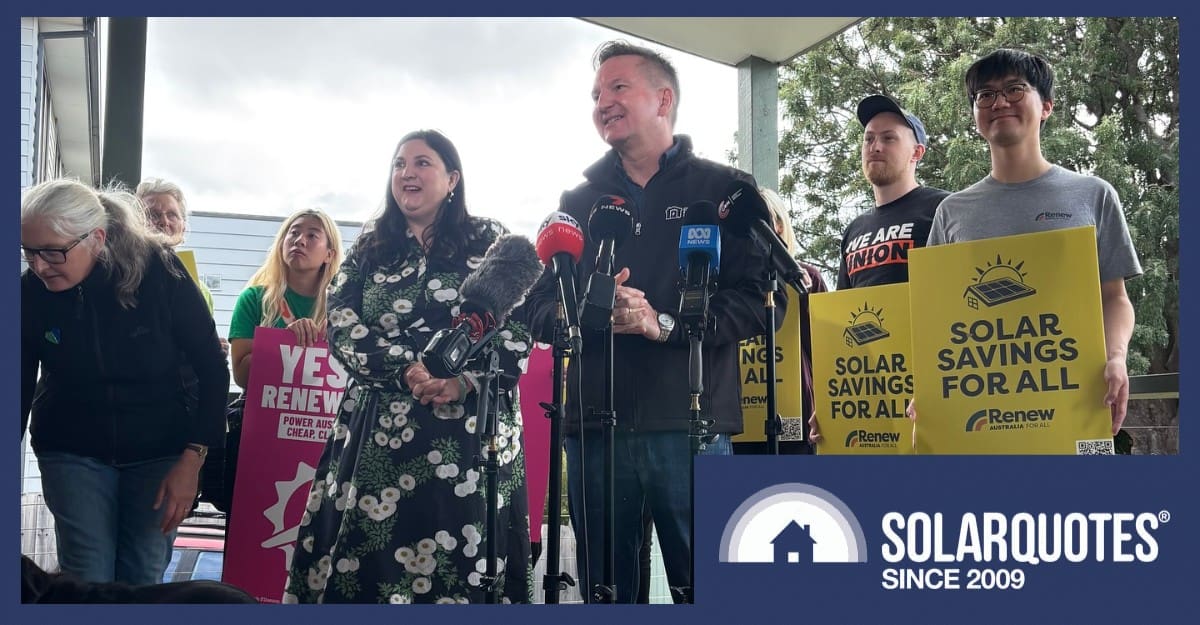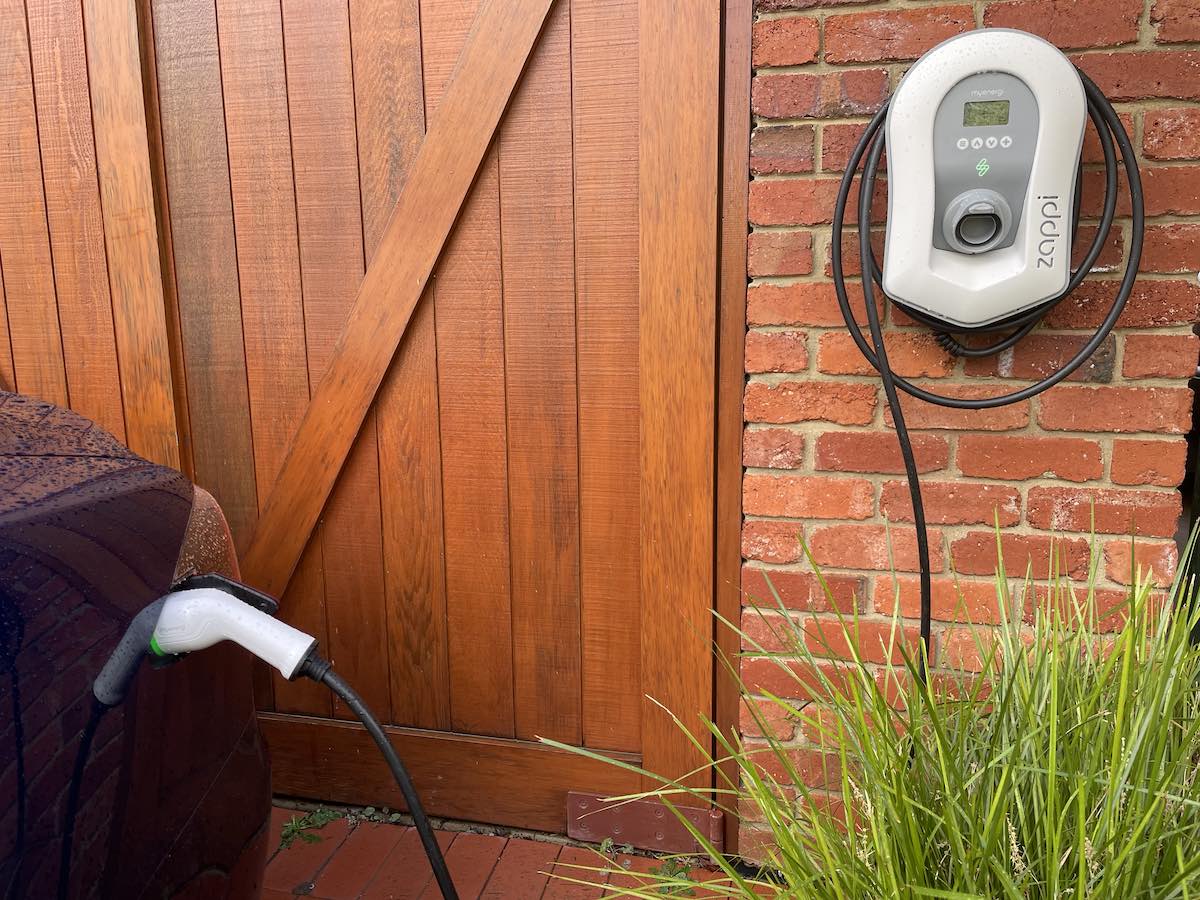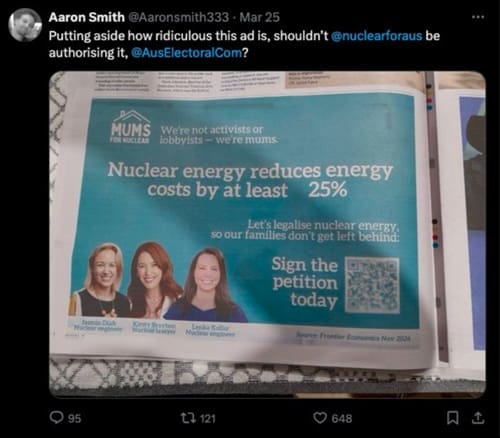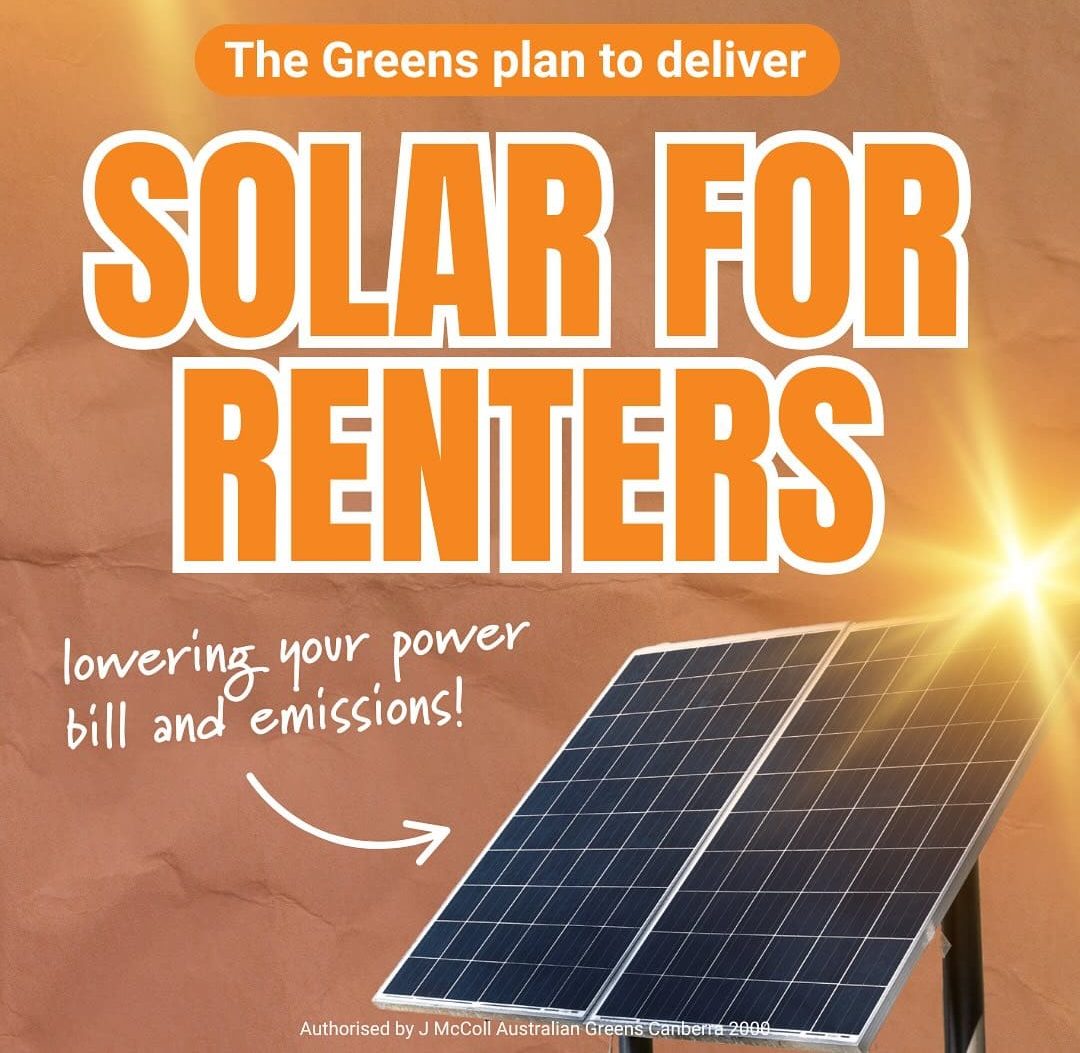
Coalition Cuts
In its release of costings on Thursday the Coalition announced it planned to axe a raft of programs related to home electrification and green energy. Programs set to be axed included:
- The $26 billion Future Made in Australia Program;
- The $19 billion Rewiring the Nation Program;
- The $16 billion National Reconstruction Fund;
- The Net Zero Economy Agency.
Funding to Department of Climate Change, Energy, Environment and Water will also be cut substantially, while plans for additional funding for ARENA and the Clean Energy Finance Corporation will be curtailed.

The Coalition has pledged to get rid of the fringe benefit tax exemption for electric vehicles and EV charging equipment.
Electric Vehicle Tax Breaks
A key sticking point this election has been the fringe benefit tax on electric vehicles, which allows Australians to lease an eligible EV through their employer without paying FBT.
- Opposition Leader Peter Dutton initially promised to protect this lucrative tax break for electric cars, but his party backflipped days later by declaring it would be scrapped;
- The Coalition instead is focusing on petrol vehicles, vowing to halve fuel excise for 12 months and abolish incoming fuel efficiency penalties;
- The EV fringe benefits tax exemption, which Labor has vowed to keep in place, can also apply to EV home charger equipment;
- Depending on your novated lease provider, you can salary-sacrifice the hardware and installation costs of a home EV charger and other charging accessories if they are offered in your lease package.
Gas Versus Electrification
The Coalition has proposed doubling down on gas to reduce energy prices with a plan that includes reserving gas for domestic use on Australia’s east coast.
- This is despite SolarQuotes analysis that finds almost every Australian household would save considerable amounts of money by getting off gas;
- Our in-house fact checker Ronald Brakels looked into claims made during the election that gas is efficient and vital to keeping Australian homes warm. Ronald found that in almost all cases alternative electric appliances are more efficient to run.

A nuclear lobby group has been making misleading claims about nuclear energy – ignoring the cost to owners of rooftop solar.
Nuclear Impact on Solar
Another key energy policy proposed by the Coalition is a plan to roll out nuclear power stations in the coming decades.
- Our analysis found that claims nuclear would cut energy bills ignored the huge cost to owners of rooftop solar, whose systems would need to be shut down regularly to keep always-on nuclear running;
- SolarQuotes founder Finn Peacock, who used to work in nuclear power in the UK, believes that nuclear power plants will simply never be built in Australia as there are too many obstacles in the way.
Labor’s Home Battery Rebate
Central to Labor’s election campaign is the $2.3bn Cheaper Home Batteries Program, which the Coalition costings reveal would not be supported under a Dutton government.
- This scheme would cover an up-front discount on the purchase and installation of home batteries, with a subsidy of around $372 per kilowatt-hour (kWh) useable capacity, before administrative fees and charges;
- If Labor wins the election, the official start date of this scheme is July 1, 2025, however solar batteries installed from now until then would also be eligible (provided you don’t turn them on);
- The discount is supposed to work alongside existing state schemes, which allows for some big savings through double-dipping — but also some big potential problems, including a perverse incentive for people to quit the grid entirely.
- For a home battery with a 10 kWh usable capacity, the incentive will be approximately $3,720 minus admin fees for an installation in 2025. If you want to estimate how much you could save, try our Federal Government Solar Battery Rebate Calculator;
- Don’t fall for misleading marketing from installers who suggest that the scheme is a sure thing, no matter who wins the election, as the Coalition has revealed in their costings that they will not fund the program.

The Greens are campaigning on a promise to give renters the right to get solar.
Solar For Renters
The Greens unveiled a plan to expand access to solar for renters by giving them the right to request systems be installed by their landlords.
- Under the Renters Right To Solar scheme, tenants would be able to request a solar panel system up to 8kW capacity be installed at their rental properties;
- Landlords would only be able to deny the tenant’s request on reasonable grounds, such as body corporate rules precluding it, engineering challenges or local electricity network constraints;
- A new $10bn fund established through publicly-owned Snowy Hydro would pick up the tab for the installations initially, but landlords would need to pay for the systems over time;
- Finn thinks that landlords have always been too big a barrier to solar access for renters, and as an alternative has proposed plug-and-play batteries which renters can take with them whenever they move as a solution.
After The Election
We’ll continue to cover what the election result means for solar, batteries and EV chargers, and everything else to do with home electrification. Subscribe to our free weekly newsletter for a complete rundown.

 RSS - Posts
RSS - Posts



Yes, this election is certainly a watershed moment for Australia when it comes to the environment and our power system.
Hopefully “Temu Trump” and his mates do not get the treasury benches tomorrow.
How is it a watershed moment? Greens, Labor and the Coalition have always approached things very differently.
And is climate change, the environment, or Australia’s power system a major consideration for voters? A January 2025 Roy Morgan poll has keeping day to day living costs down, improving health services and hospitals, and reducing crime and maintaining law and order as the top three based on September quarter 2024 results. But things will likely have changed since then. Have other issues overtaken the top 3, or even top 10?
My belief (not that it matters now) that it was a watershed moment, was because if Temu Trump and his mates got in, they would have basically put a halt to our transition to renewables, removed our carbon reduction goals, removed the clean fuel requirements, capped the amount of rooftop solar by limiting the amount it could contribute to the grid.
It would be useful to list where minor parties sit given we still need to fill out a Senate paper with many preferences.
We already have the Greens, but they’re the only minor party that’s treated like the majors. Media bias much?
Hi George,
The Greens have consistently increased their share of the vote, across the country, at every election and have often held the balance of power in the senate.
That their primary vote doesn’t get more lower house reps elected is down to the system, where for instance the Liberals will preference Labor above Greens.
Major parties are only getting around 35% primary vote now, while the greens regularly get 10%
They may be insufferable for some, but representation in the media is hardly a media conspiracy. Many argue that the “leaders debates” should be extended beyond just two talking heads.
Thanks for this info. It seems clear the LNP’s policies would trash the transition to clean, safe, efficient and less costly renewables.
Given only Labor or the LNP can practically form government in our system currently, the choice at this election seems absolutely stark to me. If you want clean, reliable and less expensive energy in Australia, Labor is offering it and the LNP isn’t.
Things won’t be perfect through the transition period to renewables but electricity will be cleaner and more reliable going down Labor’s renewables path than the LNP “plan”. In five to 10 years time, we will have built a solid renewables based grid plus heaps of home solar and batteries.
With the LNP’s approach, we will definitely have less reliable electricity at much greater cost. And not just for 10 years but forever.
Remember what they did to the NBN? Theirs was supposed to be “sufficient, sooner, reliable and cheaper”. It wasn’t any of these and is still being fixed at higher cost.
Thanks Patrick,
The NBN is a perfect example of nation building… that’s been squandered by the LNP.
Not to mention the snowy hydro gotta pump it too far, much better options !!
Yes for all the above reasons labour needs another 3 years
If it was up to me I would be lifting the nuclear ban and establishing a nuclear energy taskforce with the goal of establishing a framework around preparing the groundwork for starting a nuclear industry. I would call this a sensible insurance policy for at least being open to whatever technology we might need going forward. Maybe we will not adopt nuclear in its current form but better to be prepared than not.
No matter what happens we wont be getting nuclear before 2050 and we should be more concerned about the difficulties we will encounter on this very difficult task that is before us.
There is a lot said about how the future climate could turn extreme yet the current plan is to transition to a completely weather dependant system. If people cannot keep an open mind about future possibilities then how can you possibly make rational logic based decisions.
Hi Peter,
The economics haven’t favoured nuclear since the Howard days, and he’s the one who made it illegal.
We’ve been down this road before:
2007 Howard’s Switkowski Report: Nuclear would be double the price of coal or gas however carbon pricing could make nuclear power cost competitive
2016 Nuclear Fuel Cycle Royal Commission Report: it would not be viable in SA to develop a nuclear power station.
2016 SA Citizen’s Jury on Nuclear Waste: 66% of the Jury do not want nuclear to proceed under any circumstances: no First Nations consent, poor economics, unsubstantiated modelling, high cost of infrastructure, undermines SA’s reputation as a green state.
Also Peter,
AEMO GenCost 2020-2024 says nuclear is 5x the cost of renewables and batteries and 3x the time.
2019 Senate Committee said not economically unviable in Australia.
2020 Victorian Parliamentary Inquiry: nuclear without enormous subsidies is economically unviable.
2022: former Chief Scientist Alan Finkel admits: “[nuclear is] nowhere near the level to justify the government seriously considering it…. it’s hard to see any nuclear in Australia in less than 20 years,”
https://mckellinstitute.org.au/research/articles/explainer-heres-why-the-evidence-suggest-nuclear-doesnt-make-sense-for-australia/
If nuclear was so good why didn’t anything happen in the last decade under the last LNP government?
Its too slow to implement and too expensive.
Talking about nuclear steam engines is just a waste of time designed to create distraction & doubt… which suits the coal & gas industry.
At the moment all I see is it is a renewables energy only grid or bust. We cannot keep burning coal and gas so what is the backup plan as going on how delusional the world is towards reducing emissions we are looking at some very serious consequences a lot sooner than anyone would like.
I would agree with Alan Finkal and would say any nuclear before 2050 would be extremely unlikely and we may never build any in their current form. However technologies change and never say never because none of us know the future.
I did read the Switkowski report and have even met the man. You may have been down a road but that is not the one I have ever travelled.
I have a large solar system and am very much in to renewable energy. I do refuse to close my mind to the possibilies of the future particularly as this is a world wide problem and we may need to look at what is best for the world rather than living in isolation and worrying just about ourselves.
I see you deleted my reply. I expected that and will not waste my time commenting again. Switkowski as a scientist would not be happy about how you used his name to support of whatever you were trying to prove to yourself. His report was very much more than the few words you wrote so perhaps you should read it in full and understand what he actually said and then you may understand the future world everyone seems to be wanting to ignore. I look at Albo, Bowen and Dutton and despair and you probably think I am the problem. That is wierd.
Delete away.
Hi Peter,
We try to keep the comments on topic so they all get moderated before publishing… and not all make it through. Keeping this work up in a timely fashion means we have more than a couple of people moderating, so the opinion of what’s helpful varies as well.
Rest assured we value the views expressed and I personally have learnt a lot from extended comment threads in the past.
It will be interesting to see if the Nationals recognise their support for nuclear will continue to condemn them to the political wilderness, even as people from the electoral wilderness continue to support their steam engine dreams.
Peter,
It’d probably be a fine idea to form a committee to establish a framework for planning the groundwork for designing a process to formulate the scope of what might be done, if only it could. After all, an opposition needs something to do.
The great good thing is that it seems unlikely that any taxpayer funds will ever be spent on an exorbitantly expensive folly which cannot be realised in time to save capitalism as we know it.
Spending the $600B on batteries, at a controlled pace, to help lower price, rather than spike it, would take a helluva bite out of CO₂ emissions now, with global heating ROI all through the decades before we would have seen radioactive power generation. Bad crap is coming: “If we model this and project forward, around 95 per cent of northern Jakarta’s surface in 2050 will be under the sea,” :
https://www.abc.net.au/news/2019-06-24/jakarta-is-running-out-of-time-to-stop-itself-sinking/11190928
Slowing down after the crash helps infinitely less.
Great summary, very useful thank you
Well, sorry for the nuclear mum’s but hopefully by the next election, Solar and other renewables will be so entrenched as the grid’s primary provider’s that there won’t even be space for trolls to argue.
I’m saying this as someone who is seeing Amber Power reporting a -2C /kWh live feed in payment to a market with 111% of renewable energy in it: at 1.30 AM. Take that trolls for nuclear.
I’d share a screenshot of the depressing earning abilities of my battery system if I could but I can’t, it’s at at 98% full and SAPN doesn’t want to buy any of it’s goodness.
Happy non nuclear bunny 🙂
Owen – at least you should not be quite so sleepless now. I cannot understand how any political strategist could have thought that nuclear in 15-20 years time, while stopping present encouragement of renewables, cutting fuel excise when fuel prices were coming down (hence increasing greenhouse gas) and axing 41,000 public servants (supposedly only in Canberra which only has 65,000 and services are either delivered or built there) was actually acceptable policy or going to appeal to voters.
I said to my friends ahead of the election that these policies would go down badly with many voting groups and Labor would probably increase their majority a bit. But I never dreamed it would turn into a bloodbath. Maybe the electorate is not as stupid as the LNP strategists thought they were and the Trump mess had also put the wind up people.
Thankfully we can now continue the steady march to a cleaner, greener and better priced power supply.